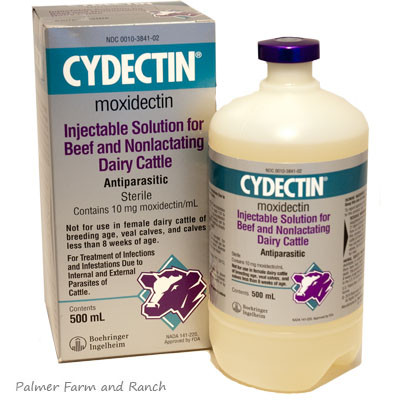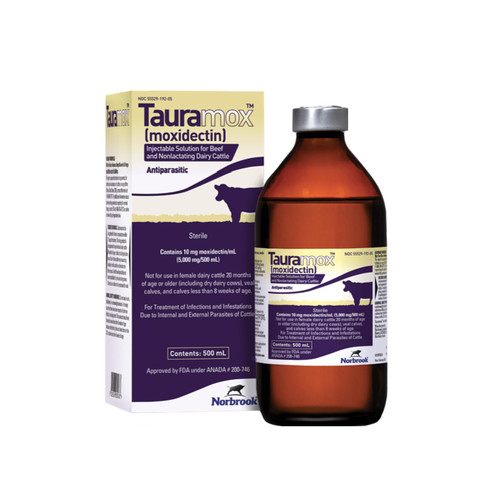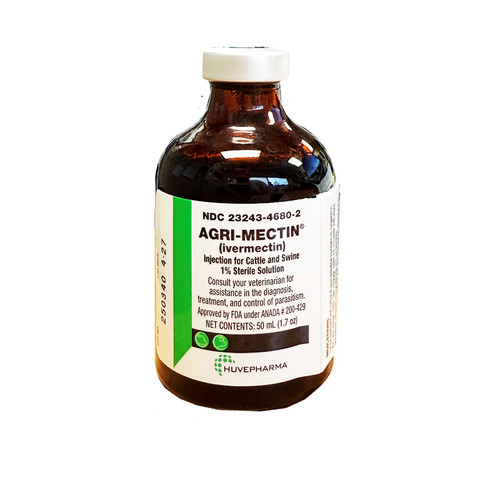Specifications
Description
Product Description
For beef cattle producers, DECTOMAX Injectable controls more parasite species and larval stages in beef cattle than any other injectable parasite control product.Indications
For the treatment and control of gastrointestinal roundworms, lungworms, eyeworms, grubs (see precautions), sucking lice and mange mites.
DECTOMAX Injectable is a ready-to-use, colorless to pale yellow, sterile solution containing 1% w/v doramectin (10 mg/mL). In cattle, DECTOMAX is formulated to deliver the recommended dosage (200 mcg/kg of body weight) when given by subcutaneous (SC) or intramuscular (IM) injection at the rate of 1 mL/110 lb. of body weight.
Approved Uses:
DECTOMAX Injectable is approved for:
-The treatment and control of internal and external parasites of cattle.
-For use in beef cattle, including pregnant cows, newborn calves and bulls
-The control of the following harmful species of gastrointestinal roundworms, lungworms, eyeworms, grubs (see precautions), sucking lice and mange mites. Consult your veterinarian for assistance in the diagnosis, treatment and control of parasitism.
-DECTOMAX has been proven to effectively control infections and protect cattle from reinfection with Cooperia punctata, Oesophagostomum radiatum and Dictyocaulus viviparus for 28 days; Ostertagia ostertagi for 21 days; and Cooperia oncophora and Haemonchus placei for 14 days after treatment.
-No other single injectable product controls a broader spectrum of internal and external parasites as DECTOMAX including 36 stages of adult parasites, L4 larvae and inhibited larvae*.
DECTOMAX Injectable controls the following: Gastrointestinal roundworms (adults and fourth-stage larvae); Ostertagia ostertagi (including inhibited larvae); O. lyrate; Haemonchus placei
Trichostrongylus axei; T. colubriformis; T. longispicularis; Cooperia oncophora; C. pectinata
C. punctata; C. surnabada (syn. mcmasteri); Bunostomum phlebotomum; Strongyloides papillosus; Oesophagostomum radiatum; Trichuris spp.
Lungworms (adults and fourth-stage larvae); Dictyocaulus viviparus; Eyeworms (adults); Thelazia spp.; Grubs (parasitic stages); Hypoderma bovis; H. lineatum
Sucking lice Haematopinus eurysternus; Linognathus vituli; Solenopotes capillatus
Mange mites Psoroptes bovis; Sarcoptes scabiei
Dosage and Administration
Administer DECTOMAX Injectable at the recommended dosage of 1 mL (10 mg doramectin) per 110 pounds body weight by either subcutaneous (SC) or intramuscular (IM) injection. Beef Quality Assurance guidelines recommend SC administration as the preferred route.
Improved Productivity:
In stocker trials, DECTOMAX Injectable helped reduce the parasite burden to improve animal productivity. Studies demonstrated that cattle treated with DECTOMAX Injectable saw performance improvement when compared to cattle treated with injectable ivermectin with clorsulon or ivermectin by up to 26 pounds (pooled treatment difference derived from meta-analysis of seven stocker trials).1
Safety Information
Precautions
DECTOMAX Injectable has a 35-day pre-slaughter withdrawal period. Do not use in female dairy cattle 20 months of age or older. Do not use in calves to be processed for veal. DECTOMAX Injectable has been developed specifically for cattle and swine. Use in dogs may result in fatalities. Consult your veterinarian for assistance in the diagnosis, treatment and control of parasitism.
Warning: Not for human use. Keep out of reach of children.
DECTOMAX Injectable is highly effective against all stages of cattle grubs. However, proper timing of treatment is important. For most effective results, cattle should be treated as soon as possible after the end of the heel fly (warble) season. Destruction of Hypoderma larvae (cattle grubs) when these grubs are in vital areas may cause undesirable host-parasite reactions, including the possibility of fatalities. Killing Hypoderma lineatum when it is in the tissue surrounding the gullet may cause bloat. Killing H. bovis when it is in the vertebral canal may cause staggering or paralysis. These reactions are not specific to treatment with DECTOMAX Injectable but can occur with any systemic treatment for grubs. Cattle should be treated either before or after these stages of grub development. Consult your veterinarian concerning the proper time for treatment. Cattle treated with DECTOMAX Injectable after the end of heel fly season may be re-treated during the winter for internal parasites, mange mites or lice without danger of grub-related reactions. A planned parasite-control program is recommended.
***Not For Sale In California
Reviews
- There are currently no reviews for this product. Pease write a review by clicking the "Write a Review" button above.





